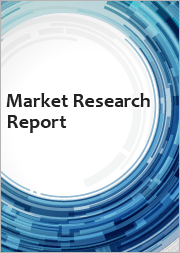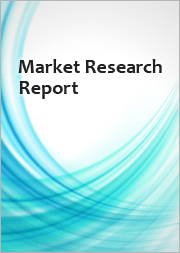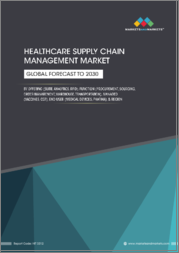
|
시장보고서
상품코드
1547456
헬스케어 공급망 관리 시장 조사 보고서 : 산업 분석, 규모, 점유율, 성장, 동향, 예측(2024-2032년)Global Healthcare Supply Chain Management Market Research Report - Industry Analysis, Size, Share, Growth, Trends and Forecast 2024 to 2032 |
||||||
헬스케어 공급망 관리 시장의 세계 수요는 2024-2032년 연평균 13.1%의 CAGR로 2023년 30억 9,010만 달러에서 2032년 약 93억 5,699만 달러에 달할 것으로 추정됩니다.
헬스케어 공급망 관리는 공급업체에서 환자까지 의료 제품, 서비스 및 정보의 흐름을 효율적으로 모니터링하는 것을 포함합니다. 여기에는 의약품, 의료기기, 소모품의 조달, 재고 관리 및 유통이 포함됩니다. 효과적인 공급망 관리는 고품질의 의료 제품을 적시에 공급하고, 비용을 절감하고, 낭비를 최소화하며, 환자 치료를 개선할 수 있습니다. 또한, 기술과 데이터 분석을 통합하여 운영을 최적화하고, 투명성을 높이고, 의료 부문의 규제 준수를 실현합니다.
시장 역학
헬스케어 공급망 관리 시장은 의료 업무의 복잡성과 규모 확대로 인해 효율적이고 간소화된 공급망 프로세스가 요구되고 있습니다. 헬스케어 공급망 관리 솔루션은 비용 절감, 낭비 최소화, 의료 서비스 제공의 효율성 향상에 도움을 주며, IoT, AI, 블록체인의 통합을 포함한 기술 발전으로 헬스케어 공급망 관리 시스템의 역량이 크게 향상되어 실시간 추적 및 데이터 기반 의사결정을 가능하게 합니다. 의사결정을 가능하게 합니다. 또한 환자 안전과 양질의 의료에 대한 관심이 높아지면서 의료용품과 의약품의 적시에 정확한 배송을 보장하는 첨단 공급망 관리 솔루션에 대한 수요도 증가하고 있습니다. 또한, 만성 질환의 증가와 외과 수술의 증가로 인해 의료 제품 수요를 관리하기 위한 견고한 공급망 관리가 요구되고 있습니다.
신흥국의 의료 인프라 확대와 의료 IT에 대한 투자 증가는 시장 성장을 더욱 촉진할 것입니다. 또한, 규제 요건과 표준 준수에 대한 요구로 인해 의료 기관은 효율적인 공급망 관리를 채택하는 경향이 있습니다. 가치 기반 의료로의 지속적인 전환과 비용 효율성 및 자원 최적화에 대한 강조도 이러한 솔루션의 채택 확대에 기여하고 있습니다. 그러나 도입의 복잡성과 데이터 통합의 어려움은 향후 몇 년 동안 시장 성장을 저해할 수 있는 요인으로 작용할 수 있습니다.
이 조사 보고서는 Porter's Five Forces 모델, 시장 매력도 분석, 밸류체인 분석을 다루고 있습니다. 이러한 도구는 산업 구조를 명확하게 파악하고 세계 수준에서 경쟁의 매력을 평가하는 데 도움이됩니다. 또한 이러한 도구는 헬스케어 공급망 관리 시장 세계 시장에서 각 부문을 포괄적으로 평가할 수 있습니다. 헬스케어 공급망 관리 시장 산업의 성장과 동향은 이 조사에 대한 전반적인 접근 방식을 설명합니다.
시장 세분화
헬스케어 공급망 관리 시장의 시장 세분화는 국가별, 지역별 부문에 대한 상세한 데이터를 제공하여 전략 담당자가 각 제품 및 서비스의 타겟층을 파악하고 향후 비즈니스 기회를 포착할 수 있도록 돕습니다.
지역 분석
이 섹션에서는 북미, 유럽, 아시아태평양, 라틴아메리카, 중동 및 아프리카의 헬스케어 공급망 관리 시장의 현재와 미래 수요를 강조하는 지역 전망을 다룹니다. 또한, 이 보고서는 모든 주요 지역의 개별 애플리케이션 부문의 수요, 추정 및 예측에 초점을 맞추고 있습니다.
맞춤형 요구사항이 있는 경우, 저희에게 연락주시기 바랍니다. 당사의 조사팀은 고객의 요구에 따라 맞춤형 보고서를 제공할 수 있습니다.
목차
제1장 서문
제2장 주요 요약
- 시장 하이라이트
- 세계 시장 현황
제3장 헬스케어 공급망 관리 시장 - 산업 분석
- 소개 : 시장 역학
- 시장 성장 촉진요인
- 시장 성장 억제요인
- 시장 기회
- 업계 동향
- Porter's Five Forces 분석
- 시장 매력 분석
제4장 밸류체인 분석
- 밸류체인 분석
- 원자재 분석
- 원자재 리스트
- 원자재 제조업체 리스트
- 주요 원자재 가격 동향
- 잠재적 바이어 리스트
- 마케팅 채널
- 직접 마케팅
- 간접 마케팅
- 마케팅 채널 발전 동향
제5장 헬스케어 공급망 관리 세계 시장 분석 : 구성요소 유형별
- 구성요소 유형별 개요
- 구성요소 유형별 과거·예측 데이터 분석
- 하드웨어
- 소프트웨어
- 서비스
제6장 헬스케어 공급망 관리 세계 시장 분석 : 전개별
- 전개별 개요
- 전개별 과거·예측 데이터 분석
- 온프레미스
- 클라우드 기반
제7장 헬스케어 공급망 관리 세계 시장 분석 : 최종사용자별
- 최종사용자별 개요
- 최종사용자별 과거·예측 데이터 분석
- 제조업체
- 유통업체
- 의료 프로바이더
- 기타
제8장 헬스케어 공급망 관리 세계 시장 분석 : 지역별
- 지역별 전망
- 소개
- 북미 매출 분석
- 개요, 실적과 예측
- 북미 : 부문별
- 북미 : 국가별
- 미국
- 캐나다
- 멕시코
- 유럽 매출 분석
- 개요, 실적과 예측
- 유럽 : 부문별
- 유럽 : 국가별
- 영국
- 프랑스
- 독일
- 이탈리아
- 러시아
- 기타 유럽
- 아시아태평양 매출 분석
- 개요, 실적과 예측
- 아시아태평양 : 부문별
- 아시아태평양 : 국가별
- 중국
- 인도
- 일본
- 한국
- 호주
- 동남아시아
- 기타 아시아태평양
- 라틴아메리카 매출 분석
- 개요, 실적과 예측
- 라틴아메리카 : 부문별
- 라틴아메리카 : 국가별
- 브라질
- 아르헨티나
- 페루
- 칠레
- 기타 라틴아메리카
- 중동 및 아프리카 매출 분석
- 개요, 실적과 예측
- 중동 및 아프리카 : 부문별
- 중동 및 아프리카 : 국가별 리스트
- 사우디아라비아
- 아랍에미리트
- 이스라엘
- 남아프리카공화국
- 기타 중동 및 아프리카
제9장 헬스케어 공급망 관리 시장 기업 경쟁 상황
- 헬스케어 공급망 관리 시장 경쟁
- 제휴·협력·계약
- 인수합병
- 신제품 발매
- 기타 개발
제10장 기업 개요
- 상위 기업의 시장 점유율 분석
- 시장 집중도
- SAP AG Group
- Oracle Corporation
- McKesson Corporation
- Providence Health & Services
- Geisinger Health System
- AmerisourceBergen
- Intermountain Healthcare
- Advocate Health Care
The global demand for Healthcare Supply Chain Management Market is presumed to reach the market size of nearly USD 9356.99 Million by 2032 from USD 3090.1 Million in 2023 with a CAGR of 13.1% under the study period 2024-2032.
Healthcare supply chain management involves the efficient oversight of the flow of medical goods, services, and information from suppliers to patients. This includes sourcing, procurement, inventory management, and distribution of pharmaceuticals, medical devices, and consumables. Effective supply chain management ensures the timely availability of high-quality medical products, reduces costs, minimizes waste, and enhances patient care. It integrates technology and data analytics to optimize operations, improve transparency, and ensure regulatory compliance in the healthcare sector.
MARKET DYNAMICS
The healthcare supply chain management market is driven by the increasing complexity and scale of healthcare operations, which necessitates efficient and streamlined supply chain processes. Healthcare supply chain management solutions help reduce costs, minimize waste, and enhance the efficiency of healthcare delivery. Technological advancements, including the integration of IoT, AI, and blockchain, have greatly improved the capabilities of healthcare supply chain management systems, enabling real-time tracking and data-driven decision-making. The growing focus on patient safety & quality care also drives the demand for advanced supply chain management solutions to ensure the timely and accurate delivery of medical supplies and medications. Additionally, the rising prevalence of chronic diseases and the increasing number of surgical procedures require robust supply chain management to manage the demand for medical products.
Expanding healthcare infrastructure in emerging economies and increased investment in healthcare IT further support market growth. Moreover, regulatory requirements and the need for compliance with standards drive healthcare organizations to adopt efficient supply chain management practices. The continuous transition towards value-based care and the emphasis on cost-efficiency and resource optimization also contribute to the growing adoption of these solutions. However, the complexity of implementation and data integration challenges may hinder market growth in the next few years.
The research report covers Porter's Five Forces Model, Market Attractiveness Analysis, and Value Chain analysis. These tools help to get a clear picture of the industry's structure and evaluate the competition attractiveness at a global level. Additionally, these tools also give an inclusive assessment of each segment in the global market of Healthcare Supply Chain Management Market. The growth and trends of Healthcare Supply Chain Management Market industry provide a holistic approach to this study.
MARKET SEGMENTATION
This section of the Healthcare Supply Chain Management Market market report provides detailed data on the segments at country and regional level, thereby assisting the strategist in identifying the target demographics for the respective product or services with the upcoming opportunities.
By Component Type
- Hardware
- Software
- Services
By Deployment
- On-Premise
- Cloud-Based
By End User
- Manufacturers
- Distributors
- Healthcare Providers
- Others
REGIONAL ANALYSIS
This section covers the regional outlook, which accentuates current and future demand for the Healthcare Supply Chain Management Market market across North America, Europe, Asia-Pacific, Latin America, and Middle East & Africa. Further, the report focuses on demand, estimation, and forecast for individual application segments across all the prominent regions.
The research report also covers the comprehensive profiles of the key players in the market and an in-depth view of the competitive landscape worldwide. The major players in the Healthcare Supply Chain Management market include SAP AG Group, Oracle Corporation, McKesson Corporation, Providence Health & Services, Geisinger Health System, AmerisourceBergen, Intermountain Healthcare, Advocate Health Care, Others. This section consists of a holistic view of the competitive landscape that includes various strategic developments such as key mergers & acquisitions, future capacities, partnerships, financial overviews, collaborations, new product developments, new product launches, and other developments.
In case you have any custom requirements, do write to us. Our research team can offer a customized report as per your need.
TABLE OF CONTENTS
1. PREFACE
- 1.1. Report Description
- 1.1.1 Objective
- 1.1.2 Target Audience
- 1.1.3 Unique Selling Proposition (USP) & offerings
- 1.2. Research Scope
- 1.3. Research Methodology
- 1.3.1 Market Research Process
- 1.3.2 Market Research Methodology
2. EXECUTIVE SUMMARY
- 2.1. Highlights of Market
- 2.2. Global Market Snapshot
3. HEALTHCARE SUPPLY CHAIN MANAGEMENT MARKET - INDUSTRY ANALYSIS
- 3.1. Introduction - Market Dynamics
- 3.2. Market Drivers
- 3.3. Market Restraints
- 3.4. Opportunities
- 3.5. Industry Trends
- 3.6. Porter's Five Force Analysis
- 3.7. Market Attractiveness Analysis
- 3.7.1 Market Attractiveness Analysis By Component Type
- 3.7.2 Market Attractiveness Analysis By Deployment
- 3.7.3 Market Attractiveness Analysis By End User
- 3.7.4 Market Attractiveness Analysis By Region
4. VALUE CHAIN ANALYSIS
- 4.1. Value Chain Analysis
- 4.2. Raw Material Analysis
- 4.2.1 List of Raw Materials
- 4.2.2 Raw Material Manufactures List
- 4.2.3 Price Trend of Key Raw Materials
- 4.3. List of Potential Buyers
- 4.4. Marketing Channel
- 4.4.1 Direct Marketing
- 4.4.2 Indirect Marketing
- 4.4.3 Marketing Channel Development Trend
5. GLOBAL HEALTHCARE SUPPLY CHAIN MANAGEMENT MARKET ANALYSIS BY COMPONENT TYPE
- 5.1. Overview By Component Type
- 5.2. Historical and Forecast Data Analysis By Component Type
- 5.3. Hardware Historic and Forecast Sales By Regions
- 5.4. Software Historic and Forecast Sales By Regions
- 5.5. Services Historic and Forecast Sales By Regions
6. GLOBAL HEALTHCARE SUPPLY CHAIN MANAGEMENT MARKET ANALYSIS BY DEPLOYMENT
- 6.1. Overview By Deployment
- 6.2. Historical and Forecast Data Analysis By Deployment
- 6.3. On-Premise Historic and Forecast Sales By Regions
- 6.4. Cloud-Based Historic and Forecast Sales By Regions
7. GLOBAL HEALTHCARE SUPPLY CHAIN MANAGEMENT MARKET ANALYSIS BY END USER
- 7.1. Overview By End User
- 7.2. Historical and Forecast Data Analysis By End User
- 7.3. Manufacturers Historic and Forecast Sales By Regions
- 7.4. Distributors Historic and Forecast Sales By Regions
- 7.5. Healthcare Providers Historic and Forecast Sales By Regions
- 7.6. Others Historic and Forecast Sales By Regions
8. GLOBAL HEALTHCARE SUPPLY CHAIN MANAGEMENT MARKET ANALYSIS BY GEOGRAPHY
- 8.1. Regional Outlook
- 8.2. Introduction
- 8.3. North America Sales Analysis
- 8.3.1 Overview, Historic and Forecast Data Sales Analysis
- 8.3.2 North America By Segment Sales Analysis
- 8.3.3 North America By Country Sales Analysis
- 8.3.4 United States Sales Analysis
- 8.3.5 Canada Sales Analysis
- 8.3.6 Mexico Sales Analysis
- 8.4. Europe Sales Analysis
- 8.4.1 Overview, Historic and Forecast Data Sales Analysis
- 8.4.2 Europe By Segment Sales Analysis
- 8.4.3 Europe By Country Sales Analysis
- 8.4.4 United Kingdom Sales Analysis
- 8.4.5 France Sales Analysis
- 8.4.6 Germany Sales Analysis
- 8.4.7 Italy Sales Analysis
- 8.4.8 Russia Sales Analysis
- 8.4.9 Rest Of Europe Sales Analysis
- 8.5. Asia Pacific Sales Analysis
- 8.5.1 Overview, Historic and Forecast Data Sales Analysis
- 8.5.2 Asia Pacific By Segment Sales Analysis
- 8.5.3 Asia Pacific By Country Sales Analysis
- 8.5.4 China Sales Analysis
- 8.5.5 India Sales Analysis
- 8.5.6 Japan Sales Analysis
- 8.5.7 South Korea Sales Analysis
- 8.5.8 Australia Sales Analysis
- 8.5.9 South East Asia Sales Analysis
- 8.5.10 Rest Of Asia Pacific Sales Analysis
- 8.6. Latin America Sales Analysis
- 8.6.1 Overview, Historic and Forecast Data Sales Analysis
- 8.6.2 Latin America By Segment Sales Analysis
- 8.6.3 Latin America By Country Sales Analysis
- 8.6.4 Brazil Sales Analysis
- 8.6.5 Argentina Sales Analysis
- 8.6.6 Peru Sales Analysis
- 8.6.7 Chile Sales Analysis
- 8.6.8 Rest of Latin America Sales Analysis
- 8.7. Middle East & Africa Sales Analysis
- 8.7.1 Overview, Historic and Forecast Data Sales Analysis
- 8.7.2 Middle East & Africa By Segment Sales Analysis
- 8.7.3 Middle East & Africa By Country Sales Analysis
- 8.7.4 Saudi Arabia Sales Analysis
- 8.7.5 UAE Sales Analysis
- 8.7.6 Israel Sales Analysis
- 8.7.7 South Africa Sales Analysis
- 8.7.8 Rest Of Middle East And Africa Sales Analysis
9. COMPETITIVE LANDSCAPE OF THE HEALTHCARE SUPPLY CHAIN MANAGEMENT MARKET COMPANIES
- 9.1. Healthcare Supply Chain Management MARKET Competition
- 9.2. Partnership/Collaboration/Agreement
- 9.3. Merger And Acquisitions
- 9.4. New Product Launch
- 9.5. Other Developments
10. COMPANY PROFILES OF HEALTHCARE SUPPLY CHAIN MANAGEMENT MARKET INDUSTRY
- 10.1. Top Companies Market Share Analysis
- 10.2. Market Concentration Rate
- 10.3. SAP AG Group
- 10.3.1 Company Overview
- 10.3.2 Company Revenue
- 10.3.3 Products
- 10.3.4 Recent Developments
- 10.4. Oracle Corporation
- 10.4.1 Company Overview
- 10.4.2 Company Revenue
- 10.4.3 Products
- 10.4.4 Recent Developments
- 10.5. McKesson Corporation
- 10.5.1 Company Overview
- 10.5.2 Company Revenue
- 10.5.3 Products
- 10.5.4 Recent Developments
- 10.6. Providence Health & Services
- 10.6.1 Company Overview
- 10.6.2 Company Revenue
- 10.6.3 Products
- 10.6.4 Recent Developments
- 10.7. Geisinger Health System
- 10.7.1 Company Overview
- 10.7.2 Company Revenue
- 10.7.3 Products
- 10.7.4 Recent Developments
- 10.8. AmerisourceBergen
- 10.8.1 Company Overview
- 10.8.2 Company Revenue
- 10.8.3 Products
- 10.8.4 Recent Developments
- 10.9. Intermountain Healthcare
- 10.9.1 Company Overview
- 10.9.2 Company Revenue
- 10.9.3 Products
- 10.9.4 Recent Developments
- 10.10. Advocate Health Care
- 10.10.1 Company Overview
- 10.10.2 Company Revenue
- 10.10.3 Products
- 10.10.4 Recent Developments
- 10.11. Others
- 10.11.1 Company Overview
- 10.11.2 Company Revenue
- 10.11.3 Products
- 10.11.4 Recent Developments



















